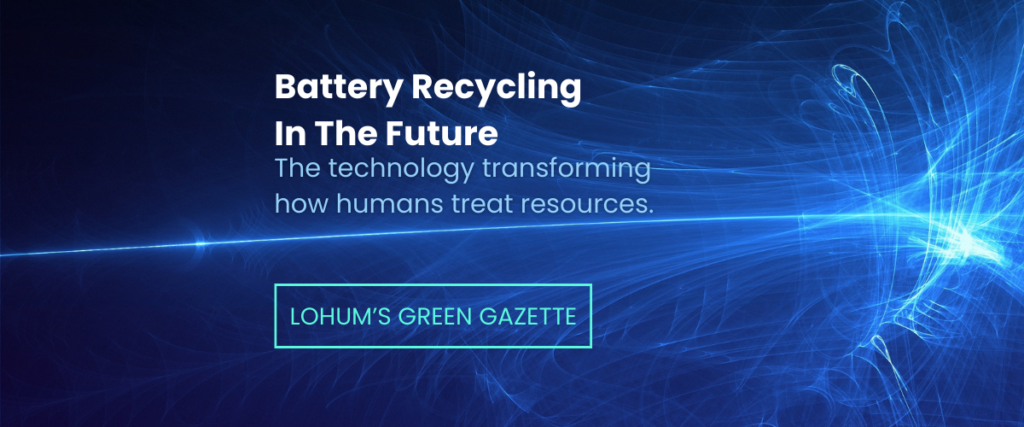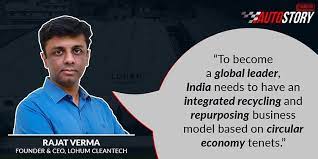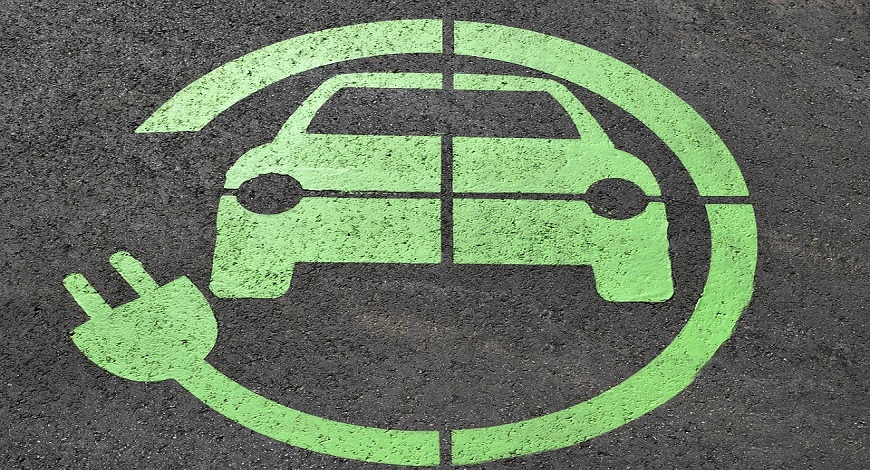
In the relentless march of the world’s rising energy needs walking hand-in-hand with technological progress, lithium ion batteries have cemented their role as the powerhouses behind our clean energy transition. From smartphones to renewable energy storage, batteries enable us to remain connected and sustainable. However, the exponential growth in battery consumption has raised a parallel challenge of disposing of these batteries in an environmentally conscious way and ensuring a sustainable supply of energy transition materials for new batteries. This is where battery recycling has emerged as a pivotal solution.
For a deeper understanding of the economic advantages of battery recycling, don’t miss our latest article on [Economic Benefits of Battery Recycling].
The global battery recycling market, reported to be at USD 26.9 billion in 2023, is projected to witness significant growth, reaching USD 54.3 billion by 2030. In terms of battery recycling capacity, India aims to scale up to 128 GWh by 2030. In this overview, we’ll explore the future of battery recycling, delving into emerging trends, cutting-edge technologies, and forecasts that promise a brighter, greener, and more sustainable world.
The escalating awareness of environmental degradation has intensified the call for responsible waste management practices. Battery recycling addresses this concern directly by ensuring that toxic materials within batteries do not infiltrate our ecosystems.
Governments across the globe are enacting stringent regulations that compel manufacturers and consumers alike to adopt sustainable practices. Extended Producer Responsibility (EPR) regulation like, India’s BWM Rules, for instance, place the responsibility of recycling and disposing of products with the manufacturers, in partnership with battery recycling and refurbishing companies.
NITI Aayog endorses the policy suggestion of battery recycling PLI schemes in its recent “Mine to Market” report on enhancing the domestic value chain for materials critical to the production of Lithium-ion batteries.
Battery recycling is not merely about dismantling and reusing. It involves advanced technologies that are shaping the future of battery waste management and energy transition material resource recovery.
Batteries house a treasure trove of materials—lithium, cobalt, nickel— that are in high demand across industries. Recycling batteries not only reduces the need for resource-intensive conventional mining but also curtails geopolitical concerns tied to material supply.
Battery manufacturers are rapidly moving toward creating batteries that are easy to disassemble and recycle. Modular designs enable the separation of valuable components, streamlining the recycling process.
Innovations in separation technologies, such as hydrometallurgical and pyrometallurgical methods, are enabling precise extraction, refining, or separation of valuable metals from end-of-life batteries.
Automation and robotics are making their presence felt in battery recycling processes, optimizing efficiency, increasing safety, and speeding up R&D while reducing the dependence on manual labor.
Urban mining, a concept where valuable materials are extracted from electronic waste including batteries, is going to outpace conventional mining. The urban mining approach diminishes the environmental impact of traditional mining while conserving finite resources, in exponentially smaller facilities that are much safer than conventional mining environments.
As we delve deeper into battery recycling trends, it’s important to note that these trends also have significant economic, social, and environmental implications. Explore the outlined in [this recent article]
These methods employ liquid solutions to extract metals from batteries. Researchers are actively exploring environmentally friendly solvents and methods that generate minimal waste. As of today, hydrometallurgy has steadily and sharply risen as an ideal process for high-yield battery recycling. For instance, LOHUM’s NEETM™ is a high-yield multi-stage hydrometallurgical Lithium-ion battery material recycling and extraction technology that produces maximum purity materials and zero waste, recovering up to 95% of all battery raw materials from a battery.
The prospect of directly recycling batteries to yield raw materials is captivating researchers. This approach eliminates the need for intermediate processing steps, simplifying the recycling process. By many accounts, direct recycling is a highly CO2e and water-efficient process, which is also why it is being researched seriously. LOHUM’s NEETM™ is a multi-stage combination of hydrometallurgical recycling and mechanical recycling processes.
Researchers are investigating the use of bacteria to extract metals from batteries, presenting a sustainable and eco-friendly solution that aligns with the circular economy principle. Biotechnology for clean energy is an emerging field in battery recycling that offers a sustainable and eco-friendly solution for recovering valuable materials from spent batteries. One of the key biotechnological methods being explored for battery recycling is bio-hydrometallurgy, which involves the use of microorganisms to extract metals from batteries. This approach is considered to be more environmentally friendly than most conventional pyrometallurgical and hydrometallurgical methods.
The road ahead for battery recycling is marked all the way with promising landmarks that signal a transformative impact to come.
The battery recycling market is poised for substantial expansion. The international lithium-ion battery recycling market was valued at USD 1.70 billion as of 2020, projected to grow from USD 2.00 billion in 2021 to USD 6.55 billion by 2028 at a CAGR of 18.5% in the forecasted period. With growing environmental concerns and the implementation of stringent regulations, the market is expected to continue experiencing significant growth for the foreseeable future.
Innovations in recycling technologies are slated to streamline processes, rendering them more efficient, economically viable, and environmentally sustainable. Significant investment into battery recycling and repurposing R&D is warranted and only innovation can bridge the gap between today and a net zero future. To that end, LOHUM invests 5% of its annual revenue to its R&D wing made up of 50 highly specialized scientists and engineers.
A concept gaining traction is the idea of repurposing batteries for less demanding applications before subjecting them to full-scale recycling. This approach maximizes the lifecycle of each battery, unlocking new second-life applications based on battery residual value derived from remaining useful life testing. LOHUM passionately endorses battery repurposing, and we always recommend it to our partners before recycling, as the potential of existing cells is forever lost when they are destroyed in the recycling process.
Battery recycling is a catalyst for job creation, innovation, and a circular economy. By reducing the reliance on virgin materials, it simultaneously addresses environmental concerns and economic interests. McKinsey estimates that a new battery-manufacturing plant with a total annual capacity of 30 to 40 gigawatt hours (GWh) may lead to as many as 3,200 new job opportunities. The report infers that a similar number of jobs may be created indirectly via suppliers, construction, food, and essential-services sectors. Similar numbers can thus be expected of the impact of a battery recycling and repurposing facility with a similar capacity.
Battery recycling’s potential extends beyond waste management—it paves the way for sustainable resource recovery and an economically viable future. As environmental consciousness soars and technology continues to evolve, the integration of battery recycling into a circular economy framework becomes pivotal.
By embracing these advancements, we not only address the mounting challenge of battery waste but also usher in economic prosperity, resource conservation, and a greener world. The future of battery recycling is undeniably bright, resonating with the promise of transforming waste into valuable resources that can keep on giving virtually forever.
Keep up with LOHUM’s series on simplifying battery recycling.
#BatteryDecoded, on our LinkedIn page for more insightful content on sustainability, battery energy, energy transition, circular economy, battery recycling, and battery repurposing!

Forbes India
Rajat Verma already recovers raw materials from used cells at his venture, Lohum Cleantech. He wants to close the loop by making cells in India as well.

YOURSTORY
In an interaction with AutoStory, Rajat Verma, Founder and CEO of Lohum Cleantech, speaks about building his company, and about battery manufacturing and repurposing as an industry.

Business World Disrupt
Recognized as ‘The Most Innovative Company of the year 2022’ by The Confederation of Indian Industry (CII), Lohum is a producer of sustainable Li-ion battery raw materials
1800 572 8822
Email : enquiry@lohum.com
G98, Site, 5, Kasna, Block A, Surajpur Site V, Greater Noida, Uttar Pradesh 201306
Lohum Cleantech Private Limited, Plot No. D-7 & 8, Site 5th, Kasna Industrial Area, Greater Noida, Gautam Budh Nagar, Uttar Pradesh – 201308
Lohum Cleantech Private Limited, Plot No. O-17, Site 5th, Kasna Industrial Area, Greater Noida, Gautam Budh Nagar, Uttar Pradesh – 201308